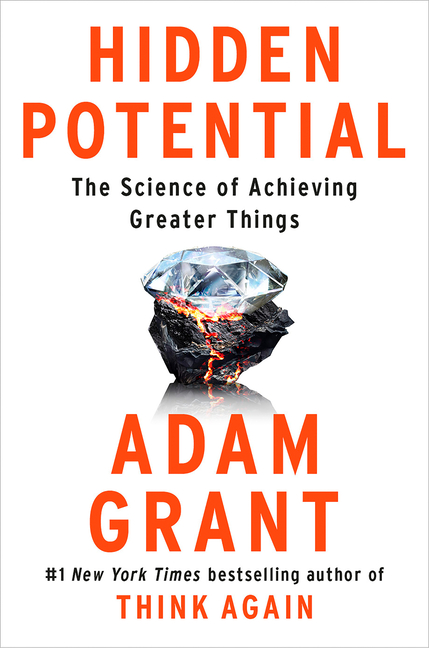
Book Resume
for Hidden Potential: The Science of Achieving Greater Things by Adam Grant
Professional book information and credentials for Hidden Potential.
- Grade Levels:*
- Grades 7-12
- Genre:
- Nonfiction
- Year Published:
- 2023
2 Subject Headings
The following 2 subject headings were determined by the U.S. Library of Congress and the Book Industry Study Group (BISAC) to reveal themes from the content of this book (Hidden Potential).
3 Full Professional Reviews
The following unabridged reviews are made available under license from their respective rights holders and publishers. Reviews may be used for educational purposes consistent with the fair use doctrine in your jurisdiction, and may not be reproduced or repurposed without permission from the rights holders.
Note: This section may include reviews for related titles (e.g., same author, series, or related edition).
From Booklist
October 15, 2023
Organizational psychologist and University of Pennsylvania professor Grant (Give and Take, 2013; Originals, 2016; Think Again, 2021) describes how anyone with the right opportunity and proper motivation to learn can achieve great success. He challenges the stereotypical notion that only innate abilities and talents lead to people being geniuses, virtuosos in their fields, and Olympic athletes. ""Potential is not a matter of where you start, but of how far you travel. We need to focus less on starting points and more on distance traveled."" Dividing his book into three sections and drawing on a variety of anecdotes and research studies, Grant illustrates how a person's character is actually formed from a set of skills learned and developed over time. He also illuminates the importance of creating a framework that sustains motivation and nurtures opportunities for individuals. Readers interested in motivational leadership, personal growth, and career development will find an enriching perspective on unlocking and engaging their hidden skills, character, and potential to achieve success.
COPYRIGHT(2023) Booklist, ALL RIGHTS RESERVED.
From Publisher's Weekly
October 2, 2023
"You don't have to be a wunderkind to accomplish great things," according to this stimulating if inconclusive study. Drawing lessons from the stories of high achievers, bestseller Grant (Think Again), an organizational psychologist at the Wharton School, contends that realizing one's potential requires getting "comfortable being uncomfortable" and recounts how Steve Martin bombed gig after gig as a young comic in the 1960s until he decided to overcome his reluctance to writing jokes (rather than improvising onstage) by writing for a variety show. Elsewhere, Grant emphasizes the importance of rethinking one's strategy after failure, describing how pitcher R.A. Dickey bounced between the major and minor leagues before polishing his knuckleball and making it central to his game, which helped him rise to the top of MLB in the 2010s. Grant is a talented storyteller, though his reliance on anecdotal evidence leaves some doubt as to the replicability of the advice. He's more successful in his data-driven exploration of how to design social systems to bring out the best in people; for instance, he points out research showing that Finland's practice of making psychologists and social workers available to struggling students leads to better education outcomes. This intrigues, even if it doesn't always convince.
From Kirkus
August 1, 2023
The author of Think Again and Originals examines how "potential is not a matter of where you start, but of how far you travel." The potential for success comes in many shapes and forms, writes organizational psychologist Grant, but the common factor is that it must be cultivated, nurtured, and developed. As a professor at Wharton and the author of a series of books in this field, the author is able to draw on a wide range of research as well as case studies from sports, the arts, chess, and even comedy. He believes that everyone has potential and that it is the duty of teachers, parents, and peers to draw it out. An early start is surprisingly important: Longitudinal studies show that children who do well in kindergarten and elementary school do much better in later life. A key point is having teachers who make learning an enjoyable activity rather than a grinding, rote process. Building character skills, such as determination, self-discipline, and resilience, is more advantageous than cramming technical information into young brains. In terms of parenting, the most valuable thing is to encourage a habit of reading. Children who see their parents read and who have access to a variety of books perform better across all criteria. A related skill is being able to write well, essential in nearly every field. Grant readily accepts that not everyone will be an Olympic athlete or an academic high-flyer; the goal, instead, should be to continually strive for improvement. Occasional failures are inevitable, but they can be an opportunity for learning and reevaluation. The author is willing to discuss some of his own setbacks and struggles, which gives the text added authenticity. He emphasizes that the book is not a self-help manual, but readers will find plenty of practical lessons and inspiring examples. Writing with authority and clarity, Grant examines how talents can be discovered, developed, and turned into achievement.
COPYRIGHT(2023) Kirkus Reviews, ALL RIGHTS RESERVED.
1 Selection for State & Provincial Recommended Reading Lists
Hidden Potential was selected by educational and library professionals to be included on the following state/provincial reading lists.
United States Lists (1)
Preview Digital Book
Explore Hidden Potential on Marketplace. Access requires OverDrive Marketplace login.
This Book Resume for Hidden Potential is compiled from TeachingBooks, a library of professional resources about children's and young adult books. This page may be shared for educational purposes and must include copyright information. Reviews are made available under license from their respective rights holders and publishers.
*Grade levels are determined by certified librarians utilizing editorial reviews and additional materials. Relevant age ranges vary depending on the learner, the setting, and the intended purpose of a book.
Retrieved from TeachingBooks on April 05, 2025. © 2001-2025 TeachingBooks.net, LLC. All rights reserved by rights holders.


